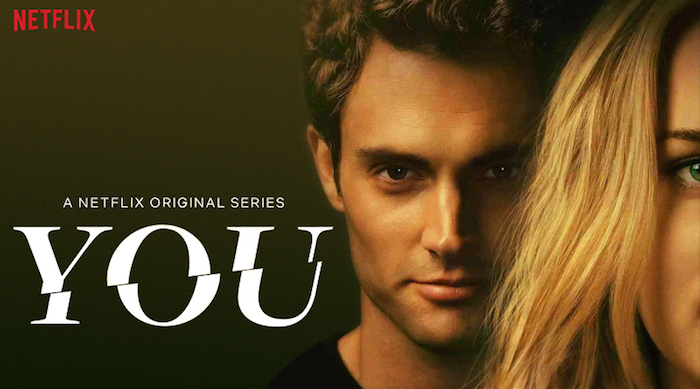Imagine it’s a Friday evening and you’re perusing Netflix for something to watch. Among their main featured shows might be a comedy special, “Big Mouth” or the newly released season two of the millennial murder-mystery-rom-com-of-sorts, “You.”
It follows Joe, played by “Gossip Girl” alum Penn Badgley, a charming bookstore employee who stalks and eventually murders his girlfriend and several other people, revealing a particularly evil side of him that it is a stark contrast to his seemingly composed nature. Like millions of other viewers, you will likely watch “You” and finish the season in a week. The story of this tortured, sadistic and lovestruck man has already drawn you in but it’s not entirely your fault. It’s just one of Netflix’s and Hollywood’s many opportunities to capitalize on society’s obsession with unhealthy relationships and make excuses for traumatized men.
It is no secret that people love to watch shows about crime and murder. And with the main narrator Joe being quite attractive, it was expected that viewers would love him and mistake his deadly actions as being romantic. For example, 14-year-old “Stranger Things” actress Millie Bobby Brown said in an Instagram story to her 18.2 million followers, “So I just started that new show ‘You’… He’s not creepy, he’s in love with her and it’s okay…”
As we watch Joe find (stalk) his next victim, who is aptly named Love, we are drawn into his deluded inner monologue as he tries to find the perfect dream girl. He is willing to do anything for this girl. When I say anything, I mean anything. All his actions— the stalking, the serial killing and the obsession— are done out of a warped idea of love and bravery, and it’s this odd manipulation and madness that viewers romanticize. Fans also empathize with Joe as we get glimpses of the abuse he suffered during his childhood— being shut in a glass box similar to the one he subjects his victims to. This fervent adoration became so much that even Badgley has spoken out to playfully shun fans over their love for a murderer.
Society’s love for murder and true crime is seen in the commercial success of shows such as “Law and Order,” “NCIS” and “Snapped.” Additionally, the appeal of dangerous men, who are usually attractive, is common in popular culture. From portrayals as mild as Edward in “Twilight” to Zac Efron’s rendition of Ted Bundy in “Extremely Wicked, Shockingly Evil and Vile,” the glorification of men who are controlling, emotionally manipulative and even mentally ill while in relationships with unsuspecting partners is a testament to how emotional violence against women is so normalized. We have become desensitized to crime and misogyny that I can’t help but think what this constant cultural stream of misinformation is doing to the minds of women and young girls.
In a country where more women are killed by their intimate partners than any other people, we have to be critical of the art that addresses gendered violence of any kind. While Netflix and the entertainment industry are just simply creating shows out of society’s fascination with death and murder, we must be careful about whether these depictions are doing more harm than good. With all the tweets and media romanticizing Zac Efron as Ted Bundy and Penn Badgley as Joe, Netflix is making a lot of money— but at what cost?
Kay-Ann Henry is a junior majoring in journalism and minoring in creative writing and sociology.
Featured image source: www.Netflix.com






